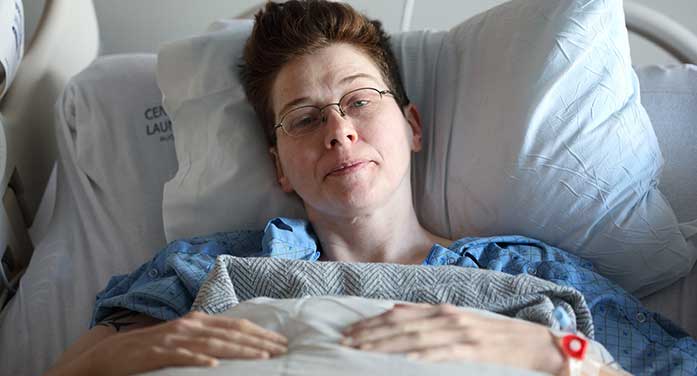A music professor and his interdisciplinary research team are aiming to reduce stress in intensive care patients with soothing soundscapes.
Based on machine learning, the “smart” sound system would read physiological feedback such as heart rate, breathing and sweat gland response to customize calming sounds for individual patients, said principal investigator Michael Frishkopf, professor in the University of Alberta’s Faculty of Arts.
The “intelligent bio-algorithmic system” would be designed to induce relaxation, improve sleep and reduce agitation, anxiety and delirium, he added.
“Just as your thermostat regulates the temperature in your house,” said Frishkopf, “why can’t there also be sonic regulation?”
High stress levels, and anxiety associated with delirium and sleep deprivation, are common in critically ill patients, often compromising recovery and survival, he said. Using drugs to treat these conditions can be expensive, often with limited effectiveness and potentially serious side effects.
Sound therapies, on the other hand, are low-cost, non-invasive and without known side effects, said Frishkopf: “Research has shown them to be highly effective if customized to the patient.”
The project will draw widely on the expertise of collaborators in music, computing science and health sciences in the faculties of arts, science, nursing, and medicine and dentistry.
Because the “autonomously adaptive soundscapes” will be regulated with artificial intelligence, said Frishkopf, there will be little need for human intervention.
“In ICU, it should be very non-invasive,” he said. “The pulse sensor just goes on your finger, like a little clip. It’s very simple, and the doctors don’t have to worry about it.
“People may not be capable of manipulating the system themselves – they may not even be conscious.”
The smart system would draw on an audio library of soundscapes preselected to reduce stress – consisting of musical, natural and synthetic sounds – adjusted and mixed in real-time to meet the patient’s specific needs.
“If it’s not working, then (the system would) try something else – or maybe raise the volume, change the treble, the bass – there are so many parameters.”
The sonic recipe might also be matched to an individual’s demographic profile, including gender, age and where they grew up.
“Maybe the sounds you heard as a child, or your musical experience, could have some special trigger for you,” said Frishkopf.
Under the supervision of Frishkopf and nursing professor Elisavet Papathanasoglou, doctoral student Shaista Meghani is conducting research on using sound therapy to treat patients who leave intensive care with post-traumatic stress disorder.
“Treatments and care experienced in the ICU or after ICU are always traumatic and stressful, and can have long-term psychological and physiological impacts affecting patients’ functional recovery and quality of life,” said Meghani.
According to a 2007 study in the journal Anaesthesia, 15 percent of ICU patients experience post-traumatic stress disorders and 25 percent experience at least one instance of psychiatric comorbidity – the coexistence of two or more psychiatric disorders – within their first year after hospitalization.
Meghani hopes the therapy Frishkopf’s team is developing will help those patients have a better quality of life.
So far, members of Frishkopf’s team have been testing the autonomously adaptive soundscapes mostly on themselves, but hope to soon get the ethical clearance to work with subjects in more relevant settings, perhaps with the aid of the new Sound3 Lab in the U of A’s Sound Studies Institute currently under construction.
“Ultimately, we need to test it in the ICU,” he said. “But with the pandemic, it’s not an easy place to work these days.”
The project is funded by Canada’s New Frontiers in Research Fund, the Alberta Machine Intelligence Institute and the pilot seed grant program out of the U of A’s Office of the Vice-President (Research and Innovation).
| By Geoff McMaster
Submitted by the University of Alberta’s Folio online magazine. The University of Alberta is a Troy Media Editorial Content Provider Partner.
© Troy Media
Troy Media is an editorial content provider to media outlets and its own hosted community news outlets across Canada.



